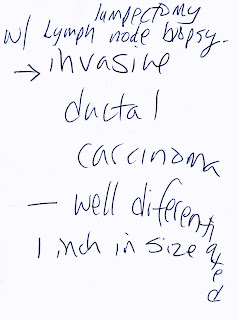My breast cancer news doesn't need micromanaging, it needs entrusting — to three key players: My husband, my mother and one girlfriend. The game plan is to have my husband tell our 'couple' friends. My mom will tell our family. My friend will tell my other friends.
But I can't call my husband at work and tell him I have breast cancer. I just can't. Because his first wife also had breast cancer. They spent 10 years fighting it. She left behind a grieving family. How can I possibly break the news that I have breast cancer, too?
We sit down for dinner and I nervously wait for him to ask if Dr. S. has called — he knows today is the day I'm supposed to hear back about my biopsy, and this is my opening to start "the conversation." But my husband doesn't ask! We are still clinging mightily to the Isle of Denial. So halfway through whatever it is we're eating (probably salad but I really can't recall), the wait is too much for me to bear. I blurt it out: "I got the call." I look up from my plate and look him straight in the eye as I say, "It's Cancer." Then I start to cry, the kind of cry that comes from the bottom of your being. The kind of cry associated with death.
My husband, who has quite a honed sense of intuition for a guy, oddly doesn't bat an eye. He calmly tells me he knew the minute I told him that I had had a biopsy that it would come back cancerous. (Don't ask me how he knew, he just did.) Thankfully he did not share those feelings with me then.
The next few minutes are a blur: tears (mine) coupled with quiet absorption (him). I can't help but notice how unruffled his composure is — he seems detached. What is that about?
Oh, right. He's been down this road before.
 |
| (copyright 2011 TheBigCandMe) |
So here's what he says to stop my crying: "It's different this time. You caught it early. You are not going to die from this." And I believe him. I have to. Like I said, he's very intuitive.
Telling hubby? Turned out to be pretty easy. Telling everyone else? Not so much.
(See Isle of Denial for more.)






